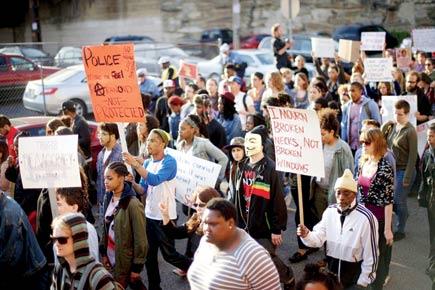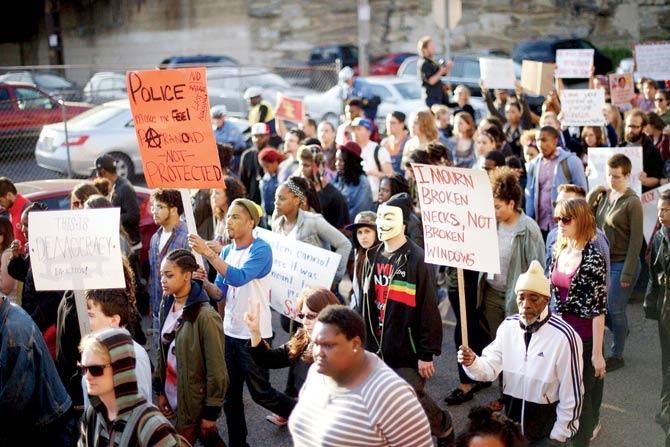Riots in the land of plenty. Somehow it doesn’t make sense. America is rich; it’s people not necessarily so. America is powerful, all it’s people, not really. Inequality and discrimination persist despite years and years of Affirmative Action.

Citizens march in Philadelphia to protest the custodial death of Freddy Gray.
 Riots in the land of plenty. Somehow it doesn’t make sense. America is rich; it’s people not necessarily so. America is powerful, all it’s people, not really. Inequality and discrimination persist despite years and years of Affirmative Action.
Riots in the land of plenty. Somehow it doesn’t make sense. America is rich; it’s people not necessarily so. America is powerful, all it’s people, not really. Inequality and discrimination persist despite years and years of Affirmative Action.
Last week, riots in Baltimore and subsequent powerful demonstrations in many American cities stunned the world. Protestors were demanding justice from a system they perceived as unfair. ‘No Justice No Peace’ was the chant. So what happened? On April 12th, an African American by the name of Freddy Gray was taken into police custody for no probable cause, transported in a van without seat belts where he died apparently due to police negligence. Riots broke out in Baltimore after Gray’s funeral on April 27th with large scale looting in shops and complete free for all that resulted in a state of emergency to be clamped down.
ADVERTISEMENT

Citizens march in Philadelphia to protest the custodial death of Freddy Gray. He was arrested for possessing a switch blade knife and died a week later from a severe spinal cord injury allegedly received due to police negligence. Pic/AFP
Police in riot gear were out on Baltimore’s streets for all of last week. It was surreal. This wasn’t the ‘60s or ‘70s. Americans were still grappling with racial inequality despite a coloured person as President. The shameful statistic that black men are 21 times more likely to be victims of police violence as compared to white men, still stares America in the face.
Almost every person interviewed on TV channels said that the system had failed the black community. Their faith in justice had withered away. Even the conservatives in the media who initially termed the rioters as street urchins, seemed to more or less agree that systemic reforms were needed to restore faith in the judicial system.
Riots in the land of plenty were shocking to America and to the rest of the world. People across the world looked on in horror as visuals played out, of people looting shops for medicine, toilet paper and ice cream. Candle light peace marches were held demanding equal rights for citizens.
This could be any developing nation struggling to cope with anger over inequitable distribution of wealth, resources and fundamental rights. These could be protest marches of Baloch in Islamabad, farmers at Jantar Mantar in Delhi, stone pelters in Srinagar, war-crimes trial activists at the Ganajagaron Manch in Dhaka...
Just five months ago, President Obama said in New Delhi at a town hall meeting, “Even as America has blessed us (Michelle and him) with extraordinary opportunities, there were moments in my life where I’ve been treated differently because of the colour of my skin. Many countries, including the United States, grapple with questions of identity and inequality, and how we treat each other, people who are different than us, how we deal with diversity of beliefs and of faiths…the aim of our work must not be to just have a few do well, but to have everybody have a chance — everybody who is willing to work for it and has the ability to dream big and then reach those dreams. Our nations are strongest when we uphold the equality of all our people.” He went on to speak about rights of Dalits, women and those who are victims of inequality in India.
It hurt our self-esteem. It seemed as if, however well meaning he was, we were being talked down to by an American President in India where he was invited as the guest of honour on the most important day of the Republic. But when you have flaws, the world will point them out to you. You cannot hide them. The world is watching as America takes corrective steps. There is no place to hide, no reason to hide, no right to hide.
When Baltimore’s State Attorney, — 35-year-old Marilyn Mosby, who comes from five generations of law enforcers — announced that six police officers were charged with murder, manslaughter and assault causing the death of Freddie Gray, whoops of joy went up in the crowd. It was a pleasant and stunning surprise which itself was telling testimony to the fact that the community did not expect justice. There was an overwhelming belief that black lives don’t matter, despite protests and riots.
There is now a slow return to faith in the judicial system, an acceptance that conviction may not happen in this case but repairing of a broken system is happening. It must also be a lesson to American commentators that nobody has figured out Why Riots Happen. And inequalities exist in every society; so really don’t jump on the pulpit so often to condemn governments of less privileged countries.
Smita Prakash is Editor, News at Asian News International. You can follow her on twitter @smitaprakash
 Subscribe today by clicking the link and stay updated with the latest news!" Click here!
Subscribe today by clicking the link and stay updated with the latest news!" Click here!







